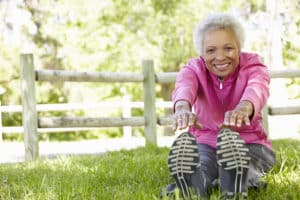Does My Elderly Mom Have Hypothyroidism?
Hypothyroidism is a thyroid disease where the gland within the neck doesn’t produce enough hormones. It is most common in elderly adults, especially women. Family caregivers may not recognize the symptoms of this disease in their aging loved ones, and it can go undetected for far too long. Without proper treatment, hypothyroidism can lead to long-term health issues.
Recognizing Hypothyroid Symptoms in Seniors

Senior Care Upper Darby, PA: Hypothyroidism and Seniors
The hormones produced by the thyroid regulate the body’s metabolism, so when it underproduces, there are problems with how energy is converted and used. One of the big problems with hypothyroidism is that the symptoms an often be quite subtle, building over time. Family caregivers and senior care providers can also mistake the symptoms for other age-related conditions.
The top symptoms of hypothyroid in elderly adults includes fatigue, weakened muscles, sore joints, weight gain, slowed heart rate, poor focus, puffy or swollen face and constipation. The thyroid may swell slightly in some cases. Because many of these symptoms are also related to other health issues, family caregivers and senior care providers should make an appointment to see a doctor as soon as they suspect the aging adult may need to be seen.
Treating Hypothyroidism in Elderly Adults
The only way that hypothyroidism can be officially diagnosed is via a doctor. When the senior gets to the clinic, they doctor will draw blood. It is then tested to confirm hypothyroidism. Treatments can begin based on what the doctor finds. Most seniors are first treated with a synthetic hormone that replaces the hormone the body naturally produces. Within a few weeks, seniors should notice their symptoms reversing and even going away completely.
Family caregivers and senior care providers should help the aging adult keep regular follow-up appointments. The doctor will continue to check hormone levels and make any changes to the prescription as needed. While there is no cure for hypothyroidism, the good news is that it can be managed quite successfully by family caregivers, senior are providers, elderly adults and doctors.
How Family Caregivers Can Help
Doctors that are treating seniors for hypothyroidism will encourage aging adults to adopt a healthier lifestyle. Nutritious foods with healthy snacks, exercise and keeping any other chronic illnesses like arthritis or diabetes under control. Family caregivers and senior care providers that assist aging adults with multiple daily tasks like housekeeping and meal preparation can be sure to increase the nutritional value of the food. Exercise, restful sleep and eliminating unhealthy habits like smoking can also help with hypothyroidism.
It’s hard to see an elderly relative age and develop different health issues and chronic diseases. However, hypothyroidism is completely controllable as long as it is detected early and the aging adult follows the doctor’s treatment plans carefully.
If you or an aging loved one are considering Senior Care in Upper Darby,PA please contact the caring staff at True Direct Home Health Care today.
- How Home Health Providers Offer Education Amidst Physical Health Changes - March 5, 2024
- Spring Activities for Seniors - February 21, 2024
- How to Help an Older Loved One with Cataracts? - February 6, 2024
